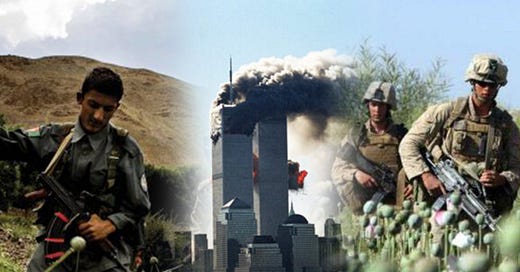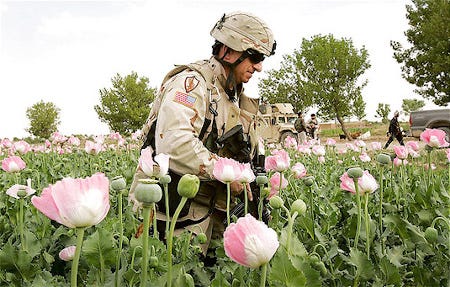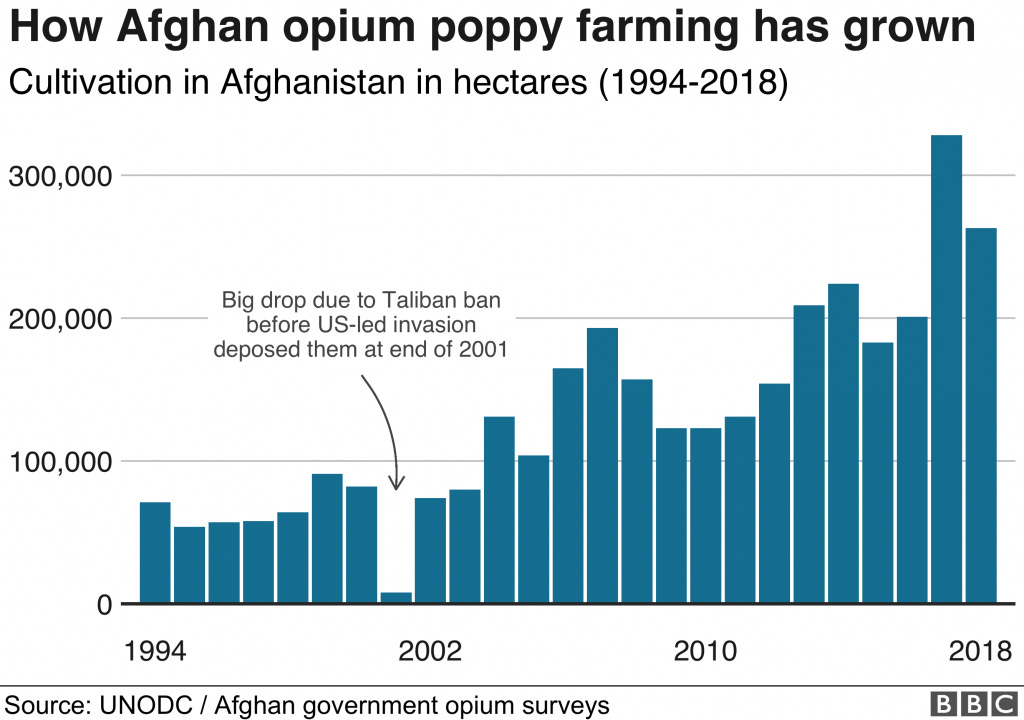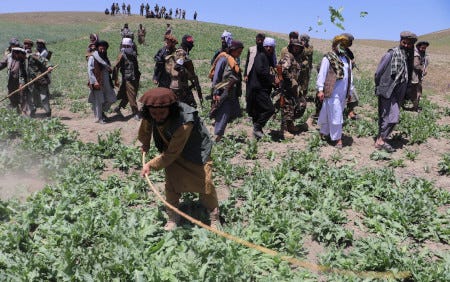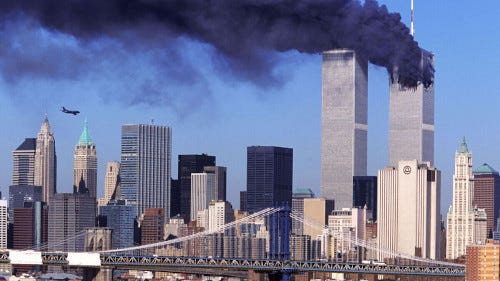by James Corbett
corbettreport.com
September 10, 2023
Remember way back in the year 2000, when the Taliban took over large swaths of Afghanistan and set about eradicating the nation's poppy crop that feeds the world opium supply?
Of course you do.
Well, guess what? It's happening again.
That's right. After Uncle Sam's ignominious retreat from the graveyard of empires in 2021, the Taliban infamously regained control of the country and set about reinstituting their campaign to ban the cultivation of opium poppies. And, once again, the results of that ban have been nothing short of remarkable.
In fact, the Taliban's latest anti-poppy campaign is already being hailed as the "most successful counter-narcotics effort in human history" by self-proclaimed Afghanistan experts, with the country's opium production down a jaw-dropping 90% this year.
And since you do remember the story of the Taliban's first successful poppy crop crackdown, then you'll also likely remember how it ended: namely, with the blank check of 9/11 being cashed in on NATO's invasion and occupation of Afghanistan in 2001, leading to the subsequent resurgence of poppy cultivation in the country.
So, are we likely to see history repeating with this next iteration of the Afghan poppy story? Let's find out.
THE PAST
The tale of the Afghan poppy war is one that can be read in the annals of the United Nations Office on Drugs and Crime (UNODC), one of the many bureaucratic arms of the UN's globalist octopus. Tasked with "helping make the world safer from drugs, organized crime, corruption and terrorism" (which apparently involves "supporting Member States in implementing the 2030 Agenda for Sustainable Development," for some unexplained reason), the UNODC has diligently documented the ups and downs of the Afghan poppy crop and its contribution to the illicit opium market in recent decades. They publish the results of this research in the form of an annual "Afghanistan Opium Survey," which tells the story in plain numbers.
In 1999, for example, this UN office informed the world that, after years of warfare and internal strife (in which the US played an integral part), Afghanistan's annual raw opium production had risen to the unprecedented level of 4,600 metric tons. They were also quick to add that "97 per cent of cultivation in 1999 occurred in Taliban-controlled areas," implying that poppy cultivation was being actively supported and encouraged by the Taliban in order to fund illicit activities.
Strange, then, that by the time of their 2001 Afghanistan Opium Survey—compiled just before the NATO invasion and occupation of the country—the UNODC bean counters (poppy counters?) were able to report that the country's total raw opium production had dropped to 185 metric tons, a 96% reduction from the record 1999 level.
So, what had happened? The Taliban happened, that's what.
Specifically, in July 2000, Mullah Mohammad Omar issued a fatwa declaring the cultivation or trafficking of poppies to be "haram" (forbidden under Islamic law). The result of that decree and its subsequent enforcement was so undeniable that not even the arch-propagandists at the Old Gray Presstitute or the Big Brother Corporation could cover it up.
As the charts make clear, the Taliban's poppy ban was remarkably successful. In fact, it was too successful for those in the deep state who have been managing and profiteering from the global drug trade since the days of William Russell. Afghanistan was providing more than 70% of the world's heroin supply at that time, and the powers-that-shouldn't-be wanted those drugs flowing again.
And we all know what happened next: 9/11. And, as we also know all too well, 9/11 led directly to the (completely fraudulent) invocation of NATO's Article 5, the subsequent invasion of Afghanistan, the overthrow of the Taliban and the resurgence of the Afghan poppy crop.
As I've been at pains to stress over the years, it would be far too simplistic to suggest that 9/11 was simply a plot to get the world opium supply growing and flowing again. But the post-9/11 boom in Afghan poppy production—reaching record high after record high after record high, as dutifully documented by the UNODC's narcotics number crunchers—was certainly more than just a happy coincidence for the 9/11 planners.
In fact, at a certain point, the blatant reality of what had just happened—namely, NATO's overthrow of a regime dedicated to eradicating the poppy crop and its installation of a puppet government dedicated to promoting it—became so undeniable that Uncle Sam's propagandists simply stopped denying it.
Who can forget that infamous 2010 Fox News clip in which the mustachioed mouthpiece of the money masters, Geraldo Rivera, interviews Lt. Col. Brian Christmas in Helmand Province about how, even though it "grinds his gut," the US military now has no choice but to guard the poor Afghan poppy farmers' precious crop?
Yes, life was pretty good for the profiteers of the drug trade in the deep state in the wake of 9/11. They had a plentiful, cheap supply of poppies to feed the global opium trade that they have been directing, protecting and profiting from since the days of the Golden Triangle. And what's more, the whole racket was being protected by the US military at US taxpayer expense! What could go wrong?
THE PRESENT
As we all know by now, the US military completed its withdrawal from Afghanistan on August 30, 2021. By that point, the Taliban—whose dramatic summer surge led to their seizing Kabul in mid-August—had already taken over the country. And so it was that 20 years of invasion, occupation, counter-insurgency operations, bloodshed and terror had accomplished precisely nothing.
Well, not exactly nothing. As we've seen, the NATO invasion and American occupation did afford the deep state drug runners another two decades of record poppy crops to feed the global heroin trade, with the UNODC reporting in 2010 that "some 90% of the world’s heroin comes from opium grown in just a few provinces in Afghanistan." It didn't take long, however, for the Taliban to bring that poppy-fueled drug money party to an abrupt halt.
In April of 2022, Haibatullah Akhundzada—the Taliban's current leader and the Supreme Leader of Afghanistan—issued a decree much like the one issued by Mullah Mohammad Omar in 2000:
All Afghans are informed that from now on, cultivation of poppy has been strictly prohibited across the country. If anyone violates the decree, the crop will be destroyed immediately and the violator will be treated according to the Sharia law.
Predictably enough, this fatwa was greeted with cynicism and outright disbelief in the West. Last November, the UNODC issued its annual opium cultivation report for the country, noting that "opium cultivation in Afghanistan increased by 32% over the previous year to 233,000 hectares – making the 2022 crop the third largest area under opium cultivation since monitoring began" and warning that "seizures of opiates around Afghanistan indicate that trafficking of Afghan opium and heroin has not stopped."
One had to read the report's accompanying press release, however, to discover that the 2022 crop had largely been exempted from Akhundzada's decree, and that the real results of the Taliban's poppy ban would not be expected to be seen until the 2023 crop was harvested.
This did not stop Washington Beltway establishment repeaters like Foreign Policy from immediately decrying the Taliban's poppy ban as mere political theater. "The Taliban that took over Afghanistan after a 20-year war largely funded by heroin trafficking have, after pretending to ban drugs, instead turbocharged the cultivation and sale of narcotics a year after their takeover," the propaganda rag—which, strangely, had never shown a particular interest in the practice of poppy cultivation before—wrote the day after the UN report's release.
This cynicism continued into 2023, with US state-funded outfit RFE/RL reporting in May that "Afghan Poppy Cultivation Jumps Despite Taliban Crackdown" and the UN blowing smoke up its own posterior by producing puff piece videos implying that the only way the poppy ban can possibly work is through the active engagement of the UN.
Imagine the Western establishment's collective shock, then, when the 2023 poppy cultivation numbers began to roll in.
The Taliban's ban, as it turns out, was not a charade. In fact, it has been, according to Graeme Smith, an Afghanistan "expert" with the Crisis Group, "the most successful counter-narcotics effort in human history, according to the volume of drugs taken off the market." And how much was that? Estimates indicate that poppy cultivation plummeted an astonishing 90% in the last year.
But, regardless of how it happened, the US/NATO PR flaks who have spent the last two decades pretending to care about the people of Afghanistan and pretending to worry about the country's opium problem must be rejoicing at this news, right?
THE FUTURE?
Wrong, of course.
No, believe it or not, the establishment is busy freaking out over the prospect of the Taliban actually achieving what the UN/US/NATO neo-colonizers only ever gave lip service to: eradicating Afghanistan's poppy crop.
And how, exactly, can they spin the Taliban's successful eradication campaign—the same campaign that they were calling a total sham just months ago, mind you—as a bad thing, you ask?
Well, the arch-conspirators at Chatham House (aka the CFR mothership in London) have attempted to spin away the Taliban's amazing accomplishment by arguing that, yes, the Taliban have accomplished the previously unimaginable in virtually eliminating poppy production in the country, but it's actually just a grand ploy by the Taliban to trick people into liking them by actually improving their country! The cads! Don't trust them! Besides, the last poppy ban didn't last very long because of . . . some unnamable reason . . . so this one probably won't either.
The presstitutes at Time, Filter, The World and other pushers of approved propaganda, meanwhile, have all (by some remarkable coincidence or other) simultaneously hit upon the exact same talking point: if Afghan poppy farmers stop feeding the world heroin markets, then European junkies will turn to Fentanyl. So—wouldn't ya know it?—cheap Afghan opium was actually a good thing all along, and by cutting off its supply the Taliban are the bad guys once again!
But of all the pretzel-logic op-eds spewed out by the pro-opium, anti-Taliban crowd in recent months, by far the most chilling is "The Taliban’s Successful Opium Ban is Bad for Afghans and the World" by former World Bank economist William Byrd.
His commentary starts out by noting the remarkable success of the Taliban's poppy ban, acknowledging that it was accomplished by a "sophisticated, staged approach" that exempted the crop that was about to be harvested, and pointing out that the current ban is actually even more comprehensive than the Taliban's previous ban, as it prohibits the trade and processing of opiates, not just poppy cultivation.
But Byrd is quick to point out all of the ways that this remarkably successful narcotics eradication program is actually bad for Afghanistan (and the world!). The country's poppy farmers have lost $1 billion of revenue—revenue that, his analysis fails to spell out, those farmers could have earned by feeding the world heroin markets. This economic downturn, he writes, will cause a migration crisis, with poor farmers trying to cross the border in the hopes of making it to Europe. And this will all lead to more heroin overdoses in Europe as dealers adulterate their supply to offset rising costs.
So far, so boilerplate. It's where Byrd ventures into "solutions" to this "problem" of decreasing opium supplies that we start to see the dark specter of future intervention at play. In this final section, he raises the question of an "international response" and then proceeds to list all of the things that will not work.
The situation "may provide a well-grounded justification for more humanitarian assistance" in Afghanistan, but "this would just be a band-aid to provide temporary relief unless and until the opium ban is rescinded or undercut."
Programs offering rural development aid "could be helpful" but "the modest amounts of money involved will at best have a marginal impact."
And as for the expected migrant crisis? Well, there's no help there, either. "Trying to block people flows at the Afghan border will work only imperfectly, and to the extent it is successful will worsen privation and hunger within the country."
All of these negative points are meant to leave us with one overwhelming (and unstated) conclusion: this "problem" will not be "solved" as long as the Taliban are in power. If only someone could come along, depose the Taliban, and get the drugs flowing again . . .
Of course, this conclusion has to be left unsaid. After all, Byrd's analysis is being published by the "United States Institute of Peace," a made-up, feel-good institution that, its "About" page informs us, was "founded by Congress and dedicated to the proposition that a world without violent conflict is possible, practical and essential for U.S. and global security." All of which sounds fine and dandy until you use the globalese decoder ring to discover what a "world without violent conflict" actually means to the Washington warhawks: a world in which every state in the world does what their US State Department overlords tell them to do, no questions asked.
It seems the Taliban haven't gotten the message. And so, around we go again on the seemingly never-ending regime change merry-go-round.
What provocation will be used this time to motivate the people of the world for another trip to the graveyard of empires? Another "catalyzing, catastrophic event" like 9/11 to pin on some Al-CIA-da patsies? Or something that can tie I-CIA-sis to Russian operatives to American homegrown domestic terrorists, perhaps? Whatever it is, you better believe it will be spectacular.
Those who are interested in learning about the possible next steps in this unfolding agenda may be interested in joining myself, video editor extraordinaire Broc West and Ryan Cristián of The Last American Vagabond for a live pirate stream watch along of COVID-911: From Homeland Security to Biosecurity this Sunday night (September 10, 2023) at 9 PM EDT.
Meanwhile, as always, the people of Afghanistan are dismissed by nearly everyone. They are treated as mere chessboard pawns who amount to little more than an afterthought in the great game of empire.
And now, on the verge of another 9/11 anniversary, here we are remarking yet again: plus ça change, plus c’est la même chose.
To support The Corbett Report and to access the full newsletter (including this month’s subscriber only video), please sign up to become a member of the website.

